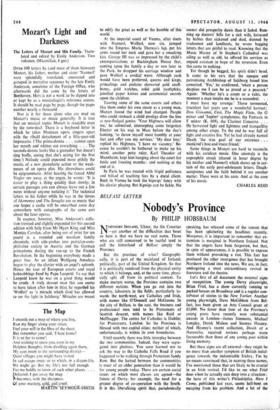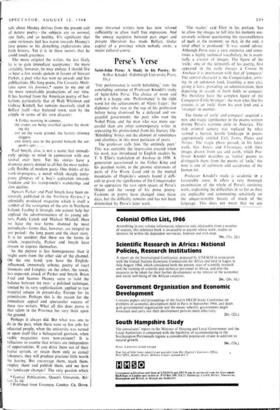Nobody's Province
BELFAST LETTER
By PHILIP HOBSBAUM
NORTHERN IRELAND, Ulster, the Six Counties —yet another of the difficulties that beset us here is that we have no real name. Those who are still concerned to be tactful tend to call the hinterland of Belfast simply the Province.
But the province of what? Geographi- cally, it is part of the mainland of Ireland; politically, part of the United Kingdom. So that it is politically sundered from the physical entity to which it belongs, and, at the same time, physi- cally split off from its political context. To make matters worse, the Province contains two different nations. When you go out into the country, labourers in the fields, particularly to- wards the north-west, are Catholics and Irish, with names like O'Donnell and McGuone. In the city of Belfast, to the east, the business and professional men tend to be Protestants of Scottish descent, with names like Reid or McIlhagger. The centre for Catholics is Dublin; for Protestants, London. So the Province is blessed with two capital cities; neither of which, unfortunately, is within its own boundaries.
Until recently there was little interplay between the two communities. Indeed, they were segre- gated into ghettoes. You soon learned not to ask the way to the Catholic Falls Road if you happened to be walking through Protestant Sandy Row. But the hatred between the communities is truer of an older generation than it would be for young people today. There are certain social issues on which most classes are agreed—the future of Derry, for example, the need for a greater degree of co-operation with the South. It is this liberalising spirit that, paradoxically
speaking, has released some of the venom that has been splattering the headlines recently. Moreover, it is important to remember that ex- tremism is marginal in Northern Ireland. Not that the angers have been forgotten, but that, in spite of appearances, it is possible to express them without provoking a riot This fact has produced the other resurgence that has brought Northern Ireland into the news. We are, in fact, undergoing a most extraordinary revival in literature and the theatre.
Let's first of all document the external signs of recognition. The young Derry playwright, Brian Friel, has a show currently running to packed houses on Broadway and is a regular con- tributor of stories to the New Yorker. Another young playwright, Dave McGibbon from Bel- fast, has been given an Arts Council grant of £1,000. No fewer than four of the Province's young poets have recently won substantial awards in London—James Simmons, Michael Longley, Derek Mahon and Seamus Heaney. And Heaney's recent collection, Death of a Naturalist, received reviews perhaps more favotn-able than those of any young poet within living memory.
But these signs are all external—they might be no more than another symptom of British indul- gence towards the indomitable Irishry. I'm by no means convinced that, in naming these names, I've mentioned those that are likely to be crucial in an Irish revival. I'd like to see what Friel does when he actually cuts deep into a situation: the hero of this writer's Philadelphia, Here I Come, published last year, seems hell-bent on escaping from his problem. And a lot of the talk about Heaney derives from the present cult of nature poetry---the subjects are so normal, one feels, and so healthy. It's significant that some reviewers feel less warm towards Heaney's love poems or his disturbing explorations into Irish history. Yet it is in these sectors that he could touch greatness.
The more original the writer, the less likely he is to gain immediate acceptance: the more certainly, however, he may endure. I should like to hear a few words spoken in favour of Stewart Parker, a poet who has won no awards and few publications. His long poem, The Casualty Medi- tates upon his Journey,* seems to me one of the most remarkable productions of our time. It has learned from the American poetry of bar- barism, particularly that of Walt Whitman and Galway Kinnell, but remains massively sited in Belfast itself—that battered town, seen by the cripple in terms of his own disaster :
A Friday morning in summer, the cranes are being crucified against the morn- ing sky out on the waste ground, the factory chimney staggers and slowly arcs to the ground beneath the sur- geon's saw. . . .
Paul Smyth, also, is not a name that immedi- ately springs to mind in connection with our revival over here. Yet his stories have a dramatic poetry denied to all but the most techni- cally flexible of modern poets. One thinks of his work-in-progress, a novel which sharply juxta- poses glimpses of a boy's aspiration towards
freedom and his tramp-uncle's wanderings and slow decline.
Stewart Parker and Paul Smyth have been ex- tensively published in the Northern Review,t a splendidly produced magazine which is itself a symbol of the resurgence of the arts in Northern Ireland. Leafing it through, one cannot help but applaud the adventurousness of its young edi- tors, Paddy Lynch and Michael Mitchell. Here we have the two forms shunned by most periodicals—forms that, however, are integral to our period: the long poem and the short story. It is no accident that these are the forms in which, respectively, Parker and Smyth have chosen to express themselves.
So the picture is less homogeneous than it might seem from the other side of the channel. On the one hand, you have the English- influenced, immensely urbane, poetry of (say) Simmons and Longley; on the other, the rawer, less expected, attack of Parker and Smyth. Brian Friel and Seamus Heaney seem to hold the balance between the two: a polished technique, limited by its very sophistication, applied to raw material unique in present-day Europe for its primitivism. Perhaps this is the reason for the immediate appeal and spectacular success of these two writers. What all this does prove is that talent in the Province lies very thick upon the ground.
Perhaps it always did. But what was one to do in the past, when there were so few jobs for educated people, when the university was turned in upon itself like a beleaguered garrison, when viable magazines were non-existent? It is fallacious to assume that writers are independent of opportunities. If you drive them out of their native terrain, or retain them only as casual labourers, they will produce precious little worth the having. But encourage them, teach them, employ them and publish them, and see how the landscape changes! The very passion which
*Festival Publications, Queen's University, Bel- fast, 2s. 6d.
-1* Published from Eusemere, Comber, Co. Down.
once thwarted writers here has now relaxed sufficiently to allow itself free expression. And the uneasy equipoise between past anger and present liberalism has made Belfast, titular capital of a province which nobody owns, a major cultural centre.































 Previous page
Previous page